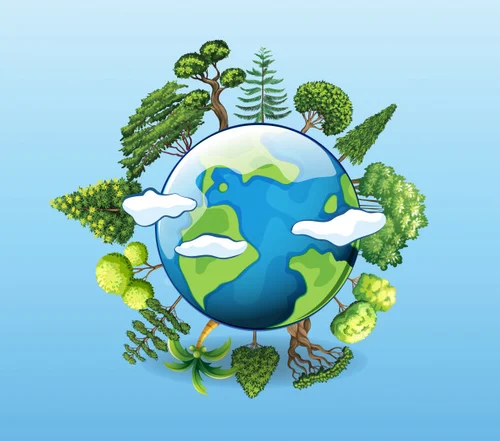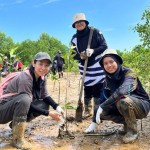As the climate crisis and environmental degradation continue to worsen, the imperative to transition those people toward a more sustainable way of life comes out even stronger. By incorporating friendly habits into our daily routines, we can easily downsize our carbon footprint safeguard crucial natural resources and sustain mother nature for future generations. This article delves into the different approaches that people can undertake in changing their ways of life and becoming more active in the environmental issues.
Energy consumption is a significant contributor to environmental degradation as it is due to the combustion of fossil fuels that release large amounts of greenhouse gases. It will be possible to secure a sustainable future if we know how to reduce the number of fossil fuels used. For instance, turning off light and radio as well as unplugging gadgets are some simple ways that usage of energy can be cut down. Further, they can switch to more eco-friendly appliances, such as energy-efficient devices having the seal of approval, the ENERGY STAR, to reduce electricity bills. Improving home insulation with such measures as sealing windows and doors and adding insulation to walls and attics can decrease the energy consumption for heating and cooling. At the same time, changing to solar panels or wind turbines is a good way to lessen the dependence on fossil fuels and hence to a cleaner energy profile.
Water is integral to our lives and yet it faces daunting challenges from the overuse and climate shifts. But water is achievable in straightforward yet impactful ways; that importantly conserve as well as sustain for the long term. The most suitable measures include the shortening of showers quickly fixing the leaks, and water-efficient equipment such as low flow toilets and showerheads. Furthermore, using rainwater collection systems to irrigate garden plants will not only lessen the pressure on drinking water sources but also stormwater runoff (UN Water 2021). In addition to these measures, they reduce the amount of energy needed to purify, store and distribute the water.
Effective waste management is crucial for protecting the environment as it encompasses the extraction of resources, production processes and disposal methods all of which have ecological consequences. To curb waste, we must first adopt an approach that emphasizes reducing consumption and reusing items. For example, opting for bags, containers and water bottles can significantly cut down on the usage of plastics and packaging waste. Composting waste such as food scraps and yard clippings not only keep these materials out of landfills but also enriches soil quality and lessens the reliance on fertilizers. Recycling materials like paper, glass and metals plays a role in conserving natural resources and minimizing energy consumption, during the creation of new products (EPA 2022).
The way we eat has an impact on the environment. Making food choices that prioritize sourcing, organic options and seasonal ingredients can help decrease the carbon footprint linked to transportation and chemical use in food production. Moreover, cutting back on meat and dairy consumption can mitigate the environmental effects of livestock farming, which contributes significantly to methane emissions a potent greenhouse gas. Focusing on foods and endorsing sustainable farming practices are powerful approaches to promote environmental well-being and minimize overall ecological impact, (FAO 2022).
Transportation plays a role in greenhouse gas emissions mainly due to its dependence on fossil fuels. Transitioning to transportation methods can significantly reduce carbon footprints. Walking, biking, carpooling and utilizing transportation options help decrease the number of individual vehicle trips leading to lower emissions and less traffic congestion. Additionally, vehicles and hybrids provide a cleaner alternative to conventional gasoline powered cars as they emit fewer pollutants and have the capability to run on renewable energy sources (ICCT 2021). Biodiversity is crucial, for maintaining ecosystem balance and resilience. People can contribute to biodiversity conservation by participating in activities that support plant and animal life. By planting species in their garden's individuals do not enhance local ecosystems but also create habitats for wildlife. Supporting conservation initiatives and refraining from using pesticides and herbicides can further aid in safeguarding biodiversity. By nurturing ecosystems individuals play a role in ensuring the long-term sustainability of our environmental systems (WWF 2022).
Education and advocacy play a role in driving broader environmental change. By raising awareness about sustainable practices and the significance of protecting the environment we can cultivate a sustainability mindset. Pushing for policies that promote conservation, like better waste management systems and renewable energy incentives can bring about changes in the system. Supporting companies and organizations that prioritize sustainability also helps create a market appetite for eco-friendly products and practices (UNEP 2022).
Shifting towards lifestyles involves more than just actions; it necessitates a concerted effort, towards building a greener future. By embracing eco-friendly habits and motivating others to follow suit we contribute to a more sustainable planet. The adjustments we implement today will leave lasting effects on environmental well-being safeguarding natural resources for generations to come.
Reference
EPA. (2022). Sustainable management of materials . Environmental Protection Agency. Retrieved from https://www.epa.gov/smm
FAO. (2022). The state of food and agriculture 2022 . Food and Agriculture Organization. Retrieved from https://www.fao.org/publications
IEA. (2020). World energy outlook 2020 . International Energy Agency. Retrieved from https://www.iea.org/reports/world-energy-outlook-2020
ICCT. (2021). Global electric vehicle market outlook . International Council on Clean Transportation. Retrieved from https://www.theicct.org/publications
UNEP. (2022). Global environment outlook . United Nations Environment Programme. Retrieved from https://www.unep.org/resources/report/global-environment-outlook
UN Water. (2021). The United Nations World Water Development Report 2021 . Retrieved from https://www.unwater.org/publications
WWF. (2022). Living Planet Report 2022 . World Wildlife Fund. Retrieved from https://www.worldwildlife.org/publications










